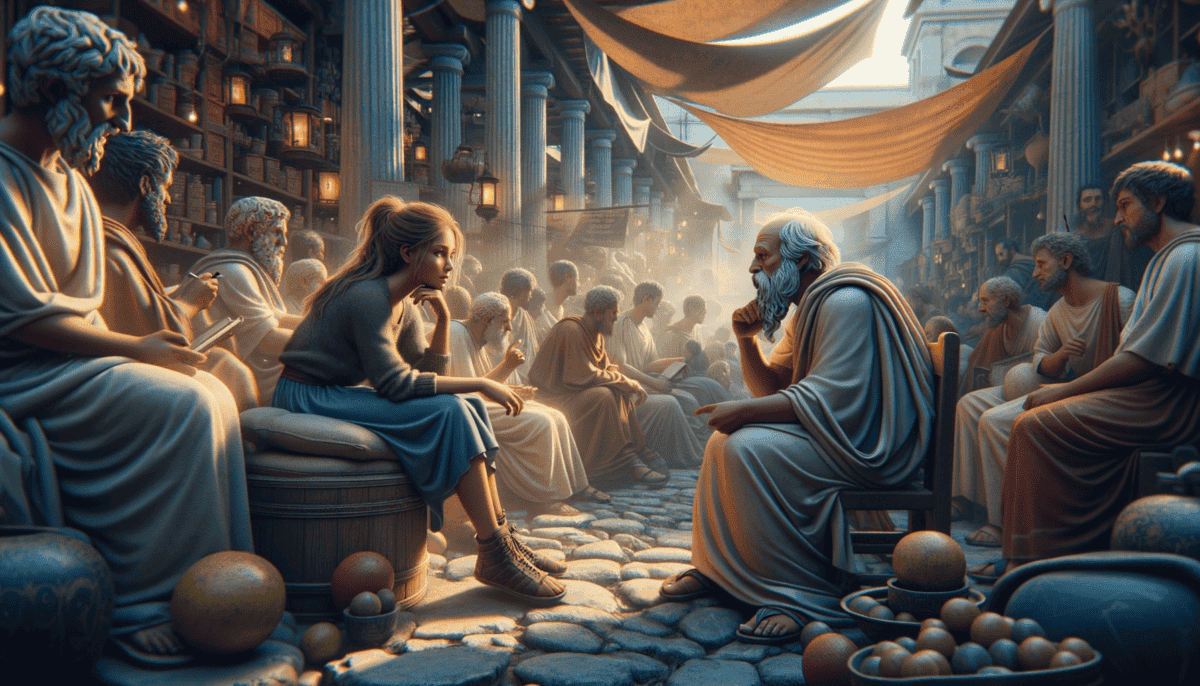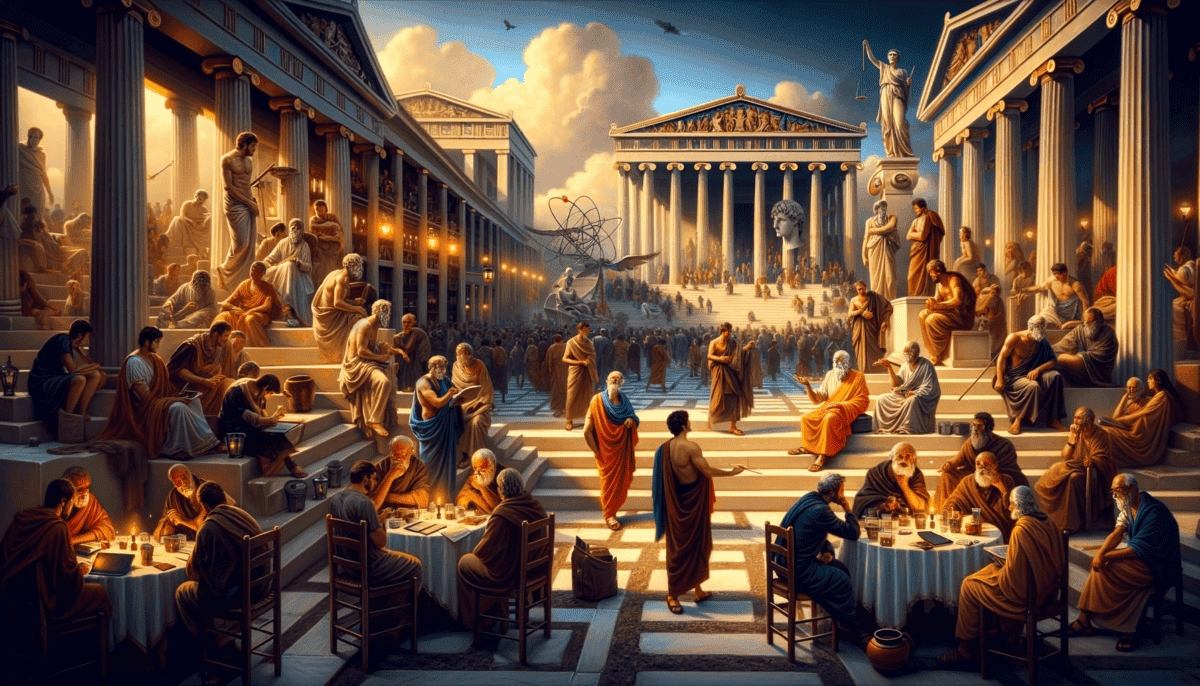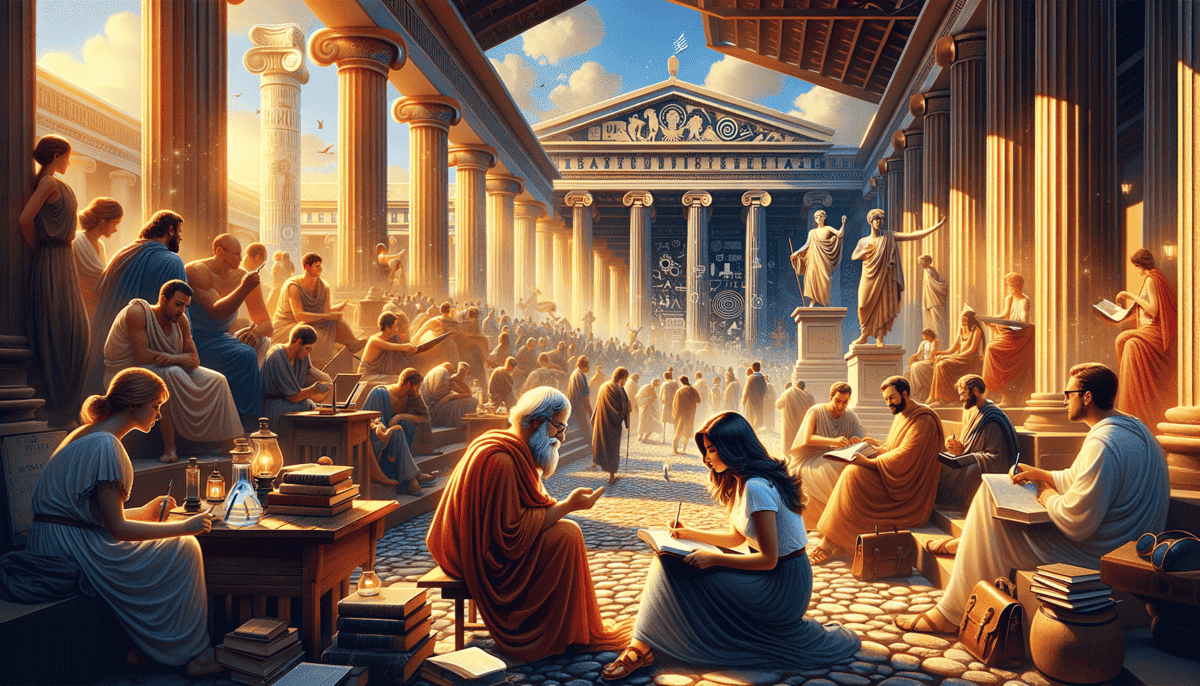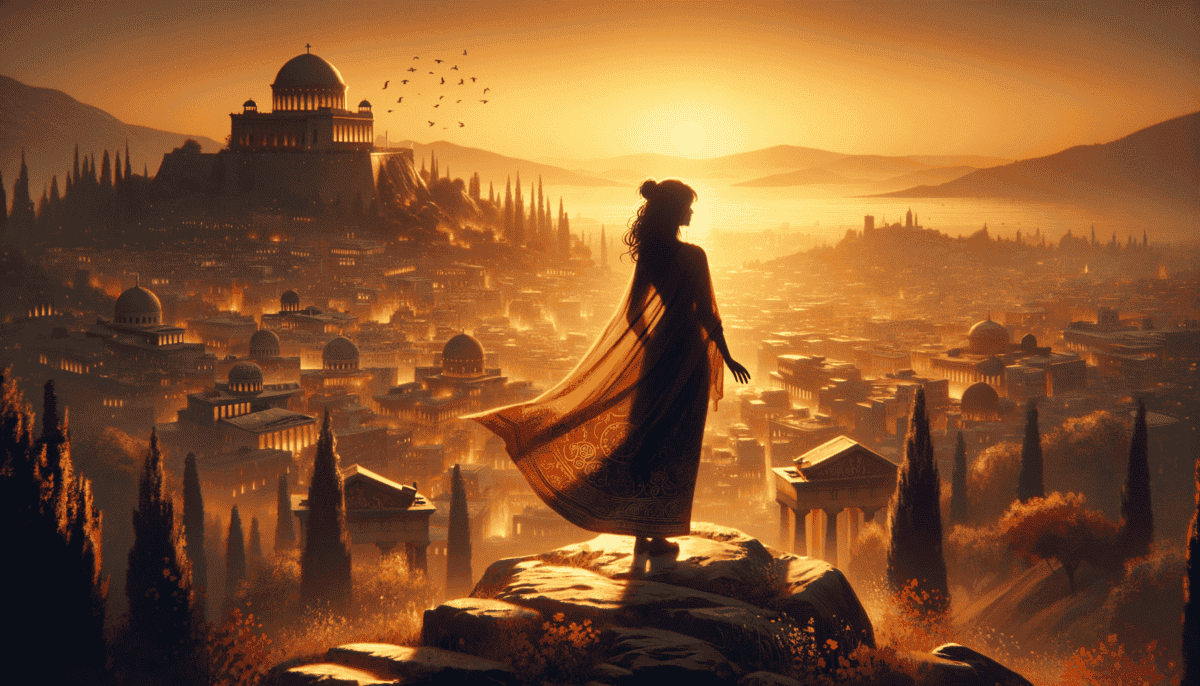A Curious Mind in Ancient Athens
The sun rose over Athens, painting the white marble buildings in shades of gold. Lydia sat on her favorite stone step, watching people hurry through the busy marketplace. She was different from other 12-year-old girls in Athens. While they learned weaving and cooking, Lydia loved to watch and wonder.
"Why is the sky blue?" she whispered to herself. "Why do leaves change color? Why do people believe what they believe?"
Her mother's voice called from inside their small house. "Lydia! Stop daydreaming and come help with the morning chores!"
Lydia sighed and stood up, but her eyes caught something interesting. A group of people had gathered near the olive oil seller's stand. They weren't buying oil – they were listening to someone talk.
"What makes something good?" a deep voice asked. "Is it good because the gods say it's good, or do the gods say it's good because it already is good?"
The crowd murmured. Some scratched their heads. Lydia moved closer, forgetting all about her chores.
"Look at this apple," the speaker held up a red fruit. "We say it's good because it's sweet and feeds us. But what if we didn't need food? Would it still be good?"
This is different from any talk I've ever heard, Lydia thought. Usually, people in the marketplace just shouted about their goods or gossiped about neighbors.
A older woman noticed Lydia listening. "You should be at home, child," she said with a frown. "This is no place for girls."
But Lydia stayed where she was. The questions made her brain feel like it was dancing. She wanted to learn more.
“The only thing I know is that I know nothing,” the speaker said with a smile. The crowd laughed, but Lydia didn’t think it was funny. To her, it seemed like the most important thing anyone had ever said.
That evening, as Lydia helped her mother prepare dinner, her mind was still full of questions.
"Mother," she asked, "how do we know what we know?"
Her mother stopped kneading bread dough. "What kind of question is that?"
"Well, we know fire is hot because we can feel it. But how do we know about things we can't feel?"
Her mother shook her head. "Lydia, Lydia. Always with your head in the clouds. Focus on real things – like this bread that needs baking."
But Lydia couldn't stop thinking. The marketplace speaker had awakened something in her – a hunger bigger than any meal could satisfy.
• Sometimes questions are more important than answers
• Not everyone understands the joy of wondering why
• Learning can happen anywhere, even in a marketplace
That night, Lydia made a decision. She would find out more about these people who asked big questions. She would learn why things were the way they were. Even if others thought it wasn't proper for a girl, she would seek wisdom.
As she drifted off to sleep, the moon cast silver light through her window. Tomorrow would bring new questions, new ideas, and maybe – just maybe – some answers.
Little did Lydia know, her journey into the world of big ideas was just beginning. Her curiosity would lead her to meet some of the greatest thinkers Athens had ever known, and her life would never be the same.
The Marketplace Philosopher
The next morning, Lydia rushed through her chores early. Her heart jumped when she heard voices gathering in the marketplace again. There he was – the man from yesterday!
"Look at his funny nose!" whispered a boy nearby. "And his bare feet!"
The barefoot man noticed Lydia watching. "Young one," he called out. "Come closer. What is your name?"
"Lydia," she answered shyly.
"Tell me, Lydia, what is wisdom?"
She thought hard. "Wisdom is… knowing things?"
"Ah!" His eyes twinkled. "But how do you know if what you know is true?"
"I… I don't know," Lydia admitted.
"Excellent!" The man clapped. "That's the best answer you could give. I am Socrates, and knowing that we don't know is the beginning of wisdom."
Over the next few hours, Socrates taught Lydia a special way of learning. He wouldn't just tell her things – he asked questions that made her think deeply.
"Is a thing good because people like it, or do people like it because it's good?" he asked.
Lydia's head spun. "Both? Neither? I need to think more about this!"
Socrates smiled. "That's exactly right. Keep thinking. Keep asking why."
• Ask questions instead of giving answers
• Make people think deeply about their beliefs
• Show that we all have more to learn
A small crowd gathered to watch Socrates talk with Lydia. Some people frowned – a girl talking philosophy? But others nodded, impressed by her quick mind.
"What is justice?" Socrates asked next.
"Being fair," Lydia answered quickly.
"But what is fair? If I have two cakes, and one friend is hungry while another just ate, should I give them each one cake? Is that fair?"
Lydia's eyes widened. "Oh! I see what you mean. Being fair isn't always the same as being equal."
This is amazing! Lydia thought. Every answer leads to more questions!
As the sun climbed higher, Lydia's mother appeared in the crowd. Instead of being angry, she watched with surprise as her daughter debated with the famous philosopher.
"Come tomorrow if you wish to learn more," Socrates told Lydia. "But remember – wisdom begins when we question what we think we know."
That night, Lydia couldn't sleep. Her mind was full of questions. What is truth? What is knowledge? What is right and wrong? She felt like she was seeing the world in a whole new way.
Her mother sat on the edge of her bed. "I saw you today," she said softly. "You reminded me of myself when I was young. I used to ask questions too."
Lydia sat up, surprised. "Really?"
"Yes. Perhaps… perhaps it's time someone asked these questions again."
As Lydia drifted off to sleep, she smiled. Tomorrow would bring more questions, more thinking, and more chances to learn from the wise man in the marketplace. Her journey into philosophy was just beginning, and she couldn't wait to see where it would lead.
The Academy of Dreams
The sun cast long shadows across Athens as Lydia walked up a winding path. A tall building stood ahead. Above its door were the words: “Let no one enter who does not know geometry.” ️
“I’m scared,” Lydia whispered to Socrates, who walked beside her.
“Don’t be,” he smiled. “My student Plato runs this school. He loves curious minds like yours.”
A tall man with kind eyes greeted them at the door. “Welcome, young seeker of wisdom,” he said. “I am Plato.”
“But what makes something beautiful?” Plato asked the class. “Is a flower beautiful because we say it is? Or is there a perfect beauty that all beautiful things share?”
Lydia raised her hand. “Maybe there’s a perfect flower somewhere that all flowers try to be like?”
“Exactly!” Plato beamed. “I call this the Form of Flower. Everything we see is like a shadow of something perfect.”
The other students watched in amazement as Lydia caught on quickly. She loved how Plato made hard ideas easy to understand.
• Perfect forms exist beyond what we can see
• Our world is like shadows of these perfect things
• We can learn about perfect forms by thinking deeply
“Look at this cave drawing,” Plato said, showing a picture on the wall. “If people lived in a cave and only saw shadows, they’d think shadows were real things. But we know there’s more to see!”
Lydia’s eyes got big. “So everything we see is like a shadow of something more real?”
“Now you’re thinking like a philosopher!” Plato laughed.
Each day brought new wonders. Plato taught them about numbers, stars, and music. He showed how everything was connected by perfect patterns.
But not everyone liked these new ideas. One day, an angry man burst into class.
“You’re filling children’s heads with nonsense!” he shouted. “Stick to practical things!”
Plato stayed calm. “What is more practical than understanding truth itself?”
The angry man had no answer for that!
At home, Lydia tried to explain to her mother what she was learning.
“So there’s a perfect cat that all cats are copying?” her mother asked, confused.
“Kind of!” Lydia said. “And a perfect table, and perfect justice, and perfect love!”
Her mother smiled. “You’re changing, Lydia. Your mind is growing bigger than Athens itself.”
Days turned into weeks. Lydia learned to draw shapes, count stars, and think about big questions. Some ideas were hard to understand, but Plato never got tired of explaining.
“Remember,” he told her, “true learning isn’t about memorizing facts. It’s about seeing the perfect patterns behind everything.”
One evening, as Lydia walked home under the stars, she realized something amazing. The world wasn’t just what she could see and touch. There were perfect ideas floating above it all, like the stars themselves.
She couldn’t wait to learn more. Tomorrow would bring new questions about truth, beauty, and justice. And maybe, just maybe, she would get a tiny glimpse of that perfect world Plato talked about.
The Nature Detective
The morning sun peeked through olive trees as Lydia hurried down a new path. Today she would meet Aristotle, Plato’s smartest student.
“Look closely,” Aristotle said, holding up a leaf. “What do you see?”
Lydia squinted. “It has lines running through it, like tiny rivers!”
“Good! That’s how we learn – by looking carefully at things.” Aristotle smiled and pulled out his notebook.
“But what about Plato’s perfect forms?” Lydia asked, remembering her old teacher.
“The truth is right here,” Aristotle tapped the leaf. “In the real things we can touch and see.”
“Nature is full of patterns. Our job is to find them!” – Aristotle
Aristotle took Lydia and other students on nature walks. They counted flower petals, watched birds, and wrote down everything they saw.
• Look closely at everything
• Write down what you see
• Find patterns in nature
• Ask lots of questions
“Why do leaves fall?” Lydia asked one day.
“That’s the spirit!” Aristotle clapped. “Always ask why. Then watch and think to find the answer.”
They made lists of animals, putting them in groups:
| Animals with wings | Animals with fur | Animals that swim |
“Everything has a place,” Aristotle explained. “Finding those places helps us understand the world.”
One day, they found a baby bird that fell from its nest.
“Quick!” Lydia said. “Let’s write down everything we see!”
She was becoming a real nature detective!
They noticed its wings weren’t ready to fly. Its feathers were still growing. Its mouth opened wide for food.
“See?” Aristotle said proudly. “You’re learning to use your eyes and mind together.”
At home, Lydia started her own notebook. She drew pictures of bugs and plants. She wrote down when the sun rose and set.
“What’s this?” her mother asked, finding Lydia measuring raindrops.
“I’m doing science!” Lydia beamed. “Aristotle says that’s how we learn about the world.”
Her mother watched as Lydia carefully counted and wrote numbers in her book.
“You’re not just asking big questions anymore,” her mother noticed. “You’re finding answers!”
The seasons changed, and Lydia’s notebook got fuller. She learned that everything had a reason, a pattern, a place in the great big world.
As stars twinkled above, Lydia thought about her journey. From Socrates who taught her to ask questions, to Plato who showed her perfect ideas, to Aristotle who helped her see the wonderful patterns in nature.
Tomorrow would bring more discoveries. More animals to study. More patterns to find. The world was full of secrets, waiting for careful eyes to find them.
The Great Debate
The marketplace buzzed with excited voices. Two groups of philosophers stood facing each other. Lydia watched from the crowd, her heart racing. ️
“Happiness comes from staying calm no matter what happens!” shouted Zeno, the Stoic teacher. His students nodded.
“No, no!” called Epicurus from across the square. “Joy comes from good friends and simple pleasures!”
Lydia’s head spun. Both ideas sounded good. How could she choose?
“Sometimes the hardest thing is picking between two good ideas.” – Lydia’s thought
A kind-faced woman named Cleanthes saw Lydia’s confusion. “Come, let me show you how Stoics think.”
They sat under an olive tree. “See that cloud?” Cleanthes pointed up. “We can’t control if it rains. But we can control how we feel about the rain.” ☔
• Stoics: Be strong inside, no matter what happens outside
• Epicureans: Find joy in simple things and good friends
Later, an Epicurean named Metrodorus shared fresh bread with Lydia.
“Life is like this bread,” he smiled. “Simple things can bring great happiness when shared with friends.”
That evening, Lydia tried both ways:
| When her toy broke, she stayed calm like a Stoic | At dinner, she enjoyed simple food like an Epicurean |
“Maybe I don’t have to choose,” Lydia thought. “Maybe I can learn from both!”
The next day, she met a girl named Helena who was crying.
“My pet bird flew away,” Helena sniffled.
Lydia remembered her lessons. “We can’t control the bird,” she said like a Stoic. “But we can share this nice bread and be friends,” she added like an Epicurean.
Helena smiled through her tears.
Lydia was finding her own way of thinking!
Back at the marketplace, the debates continued. But now Lydia watched with new eyes.
“Different ideas can all be helpful,” she told her mother. “Just like we need both sun AND rain to grow gardens.” ☀️
Her mother beamed. “You’re becoming quite wise!”
That night, Lydia wrote in her notebook about what she learned:
Be strong inside like the Stoics.
Enjoy simple joys like the Epicureans.
And most importantly – think for yourself!
As she fell asleep, Lydia felt proud. She was learning to find her own path through the big ideas of the world. And tomorrow would bring even more to think about!
The Wisdom Tree
The sun rose over Athens. Lydia sat under her favorite olive tree, the same one where she first started asking big questions. So much had changed!
“Remember your first question?” Socrates appeared, smiling kindly. “You asked why the sky is blue.”
Lydia laughed. “Now I ask much bigger questions!”
Plato joined them, carrying scrolls. “You learned about perfect ideas.”
“And how to look carefully at the world,” added Aristotle, picking up a leaf to study it.
| What Lydia Used to Think | What Lydia Now Knows |
| Only teachers have answers | Everyone can think and find answers |
A group of children gathered around Lydia. “Tell us what you learned!” they begged.
Lydia smiled and began to share:
“Ask lots of questions like Socrates taught me. Look for perfect ideas like Plato showed. Study the world carefully like Aristotle. Stay strong inside like the Stoics. And find joy in simple things like the Epicureans.”
“But which way is best?” asked a small boy.
“That’s the most wonderful thing,” Lydia replied. “We can learn from all of them! It’s like making a beautiful garden with many different flowers.”
• Ask questions
• Think carefully
• Find your own path
• Keep learning
• Share what you know
As the sun set, Lydia looked at her city. Athens glowed golden in the evening light.
“What will you do now?” asked her mother.
“Keep asking questions!” Lydia grinned. “And help others ask questions too!”
The old ideas were still alive, helping people think in new ways.
That night, Lydia wrote one last time in her notebook:
“Dear friend, if you’re reading this, remember: Big ideas never die. They grow like trees, giving shade and fruit to everyone who comes after. Your mind is a garden. Fill it with wonderful thoughts!”
As stars twinkled above Athens, Lydia felt happy. Her journey had taught her something amazing: wisdom isn’t just about finding answers. It’s about loving the questions!
And somewhere in Athens, a new young thinker was just beginning to ask: “Why?” ✨






